Unit 3 Could you please clean your room全单元课件
文档属性
| 名称 | Unit 3 Could you please clean your room全单元课件 | 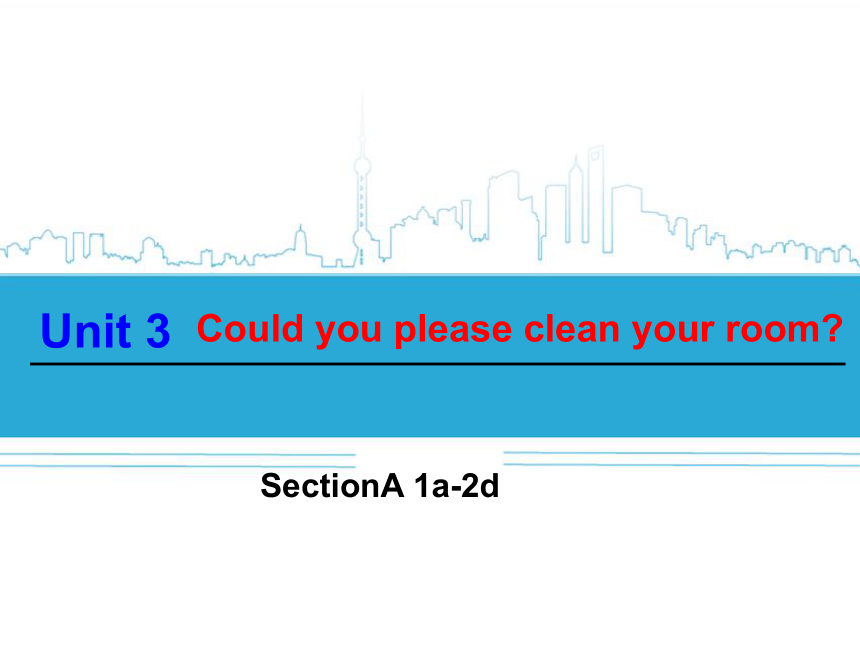 | |
| 格式 | zip | ||
| 文件大小 | 1.9MB | ||
| 资源类型 | 教案 | ||
| 版本资源 | 人教新目标(Go for it)版 | ||
| 科目 | 英语 | ||
| 更新时间 | 2018-03-16 22:28:21 | ||
图片预览

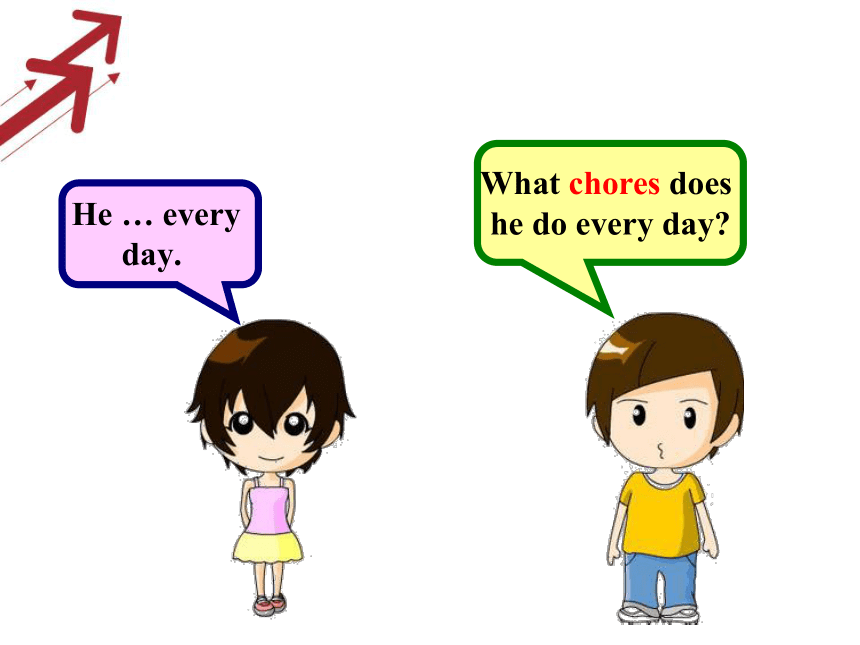
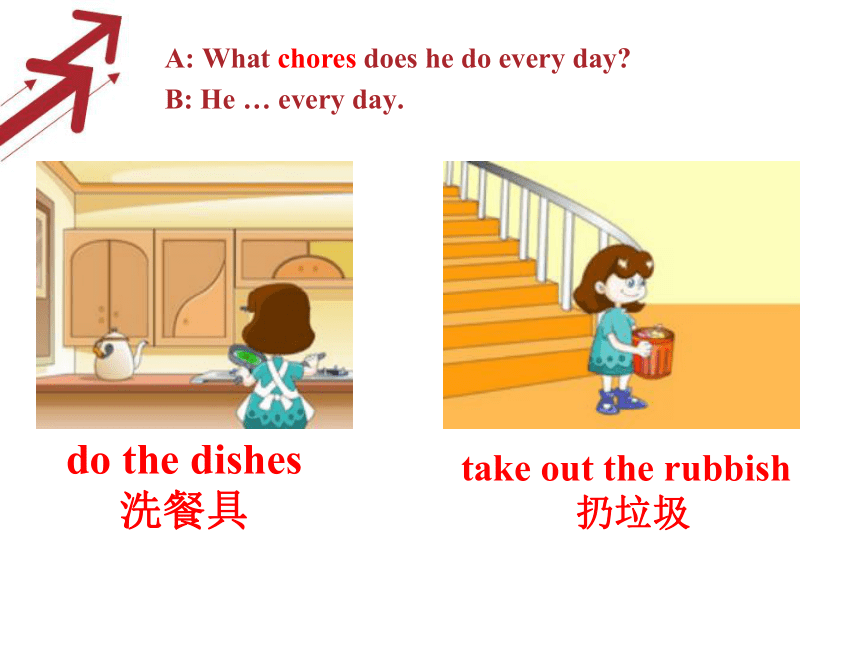
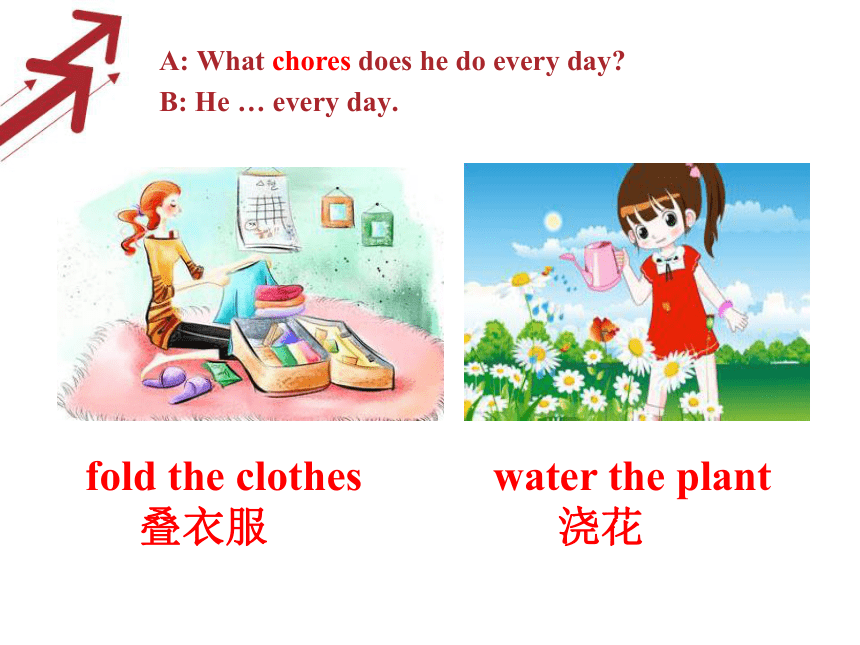
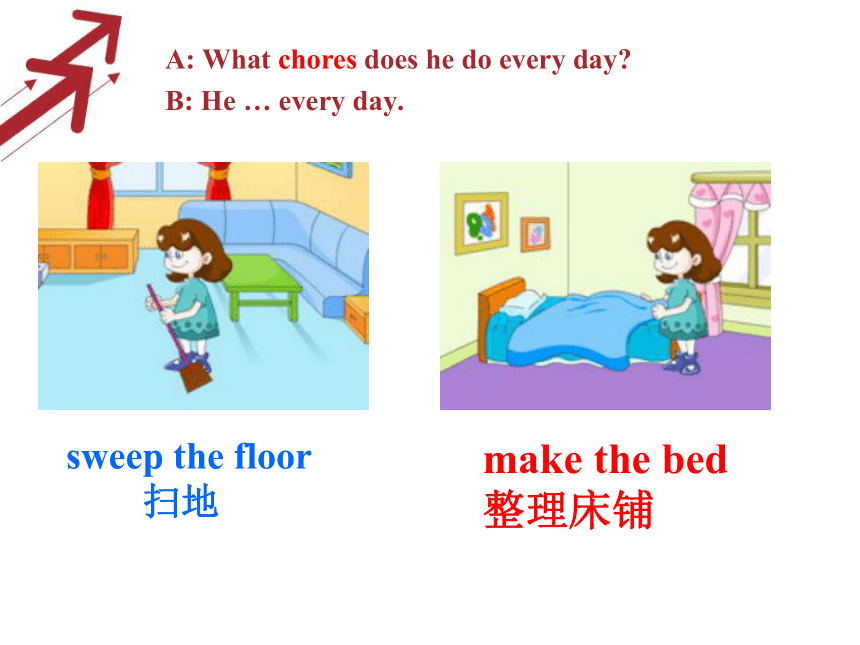
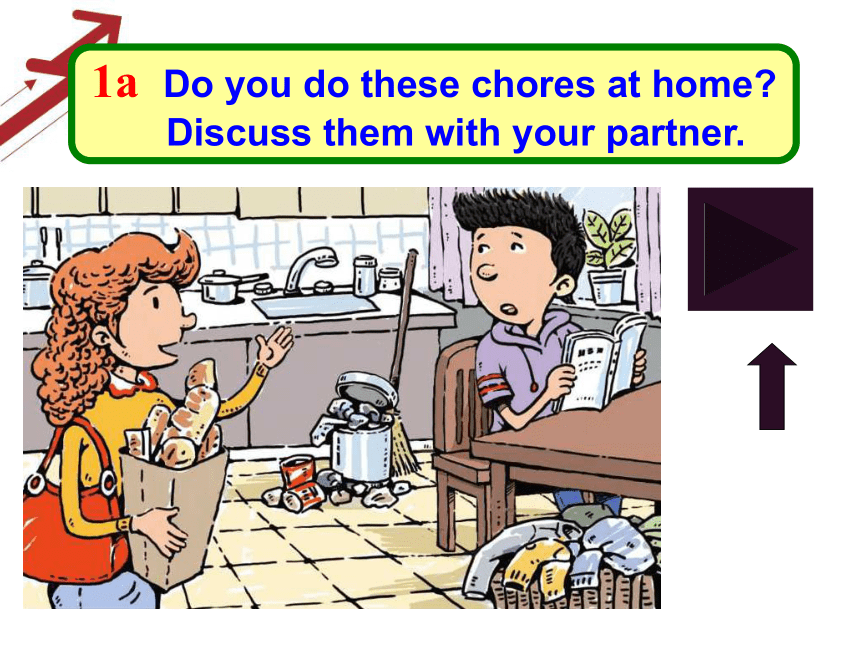
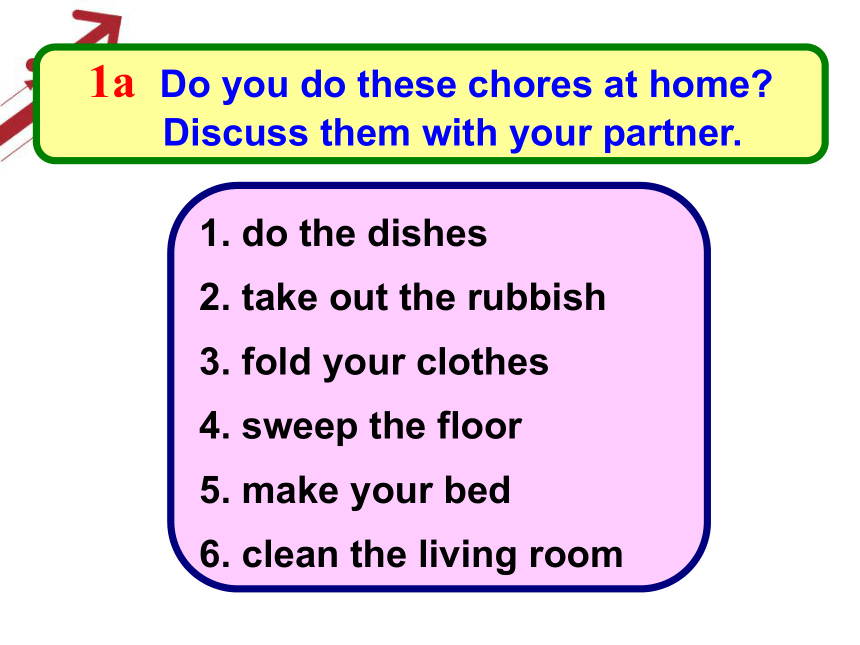
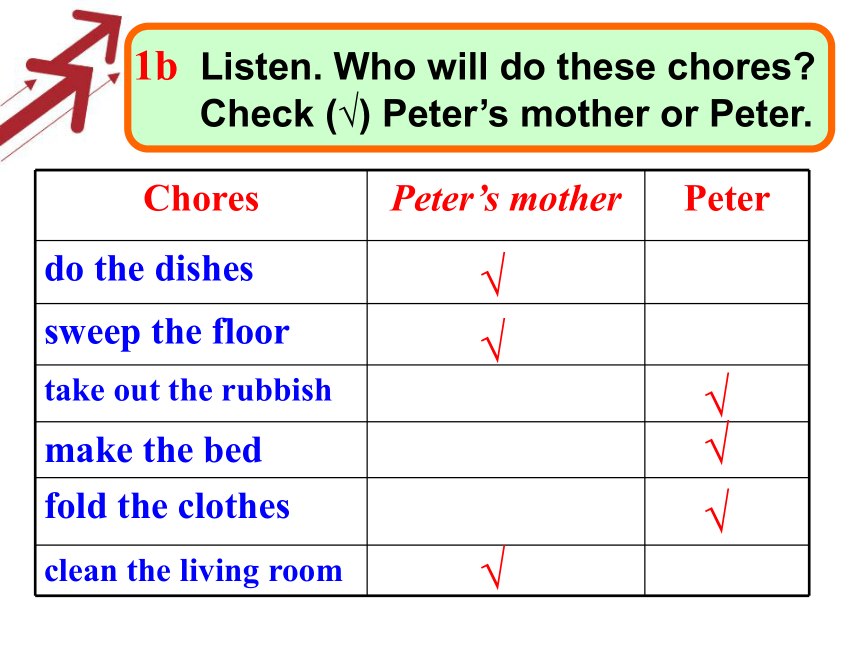
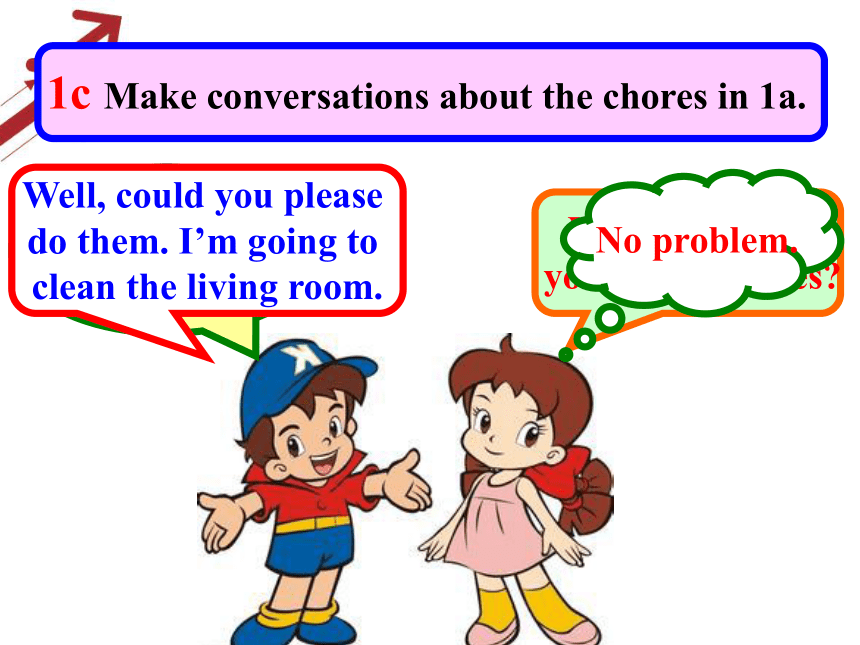
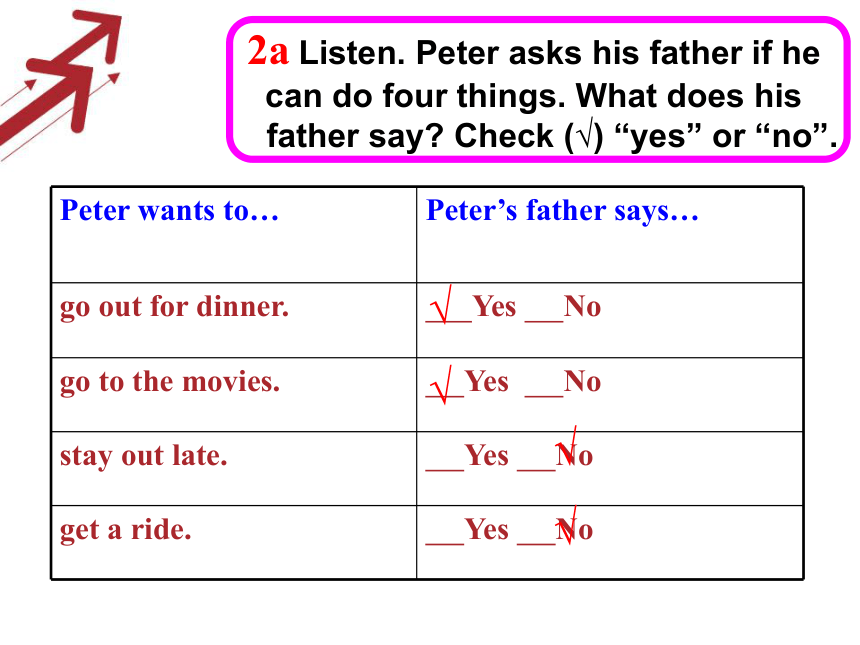
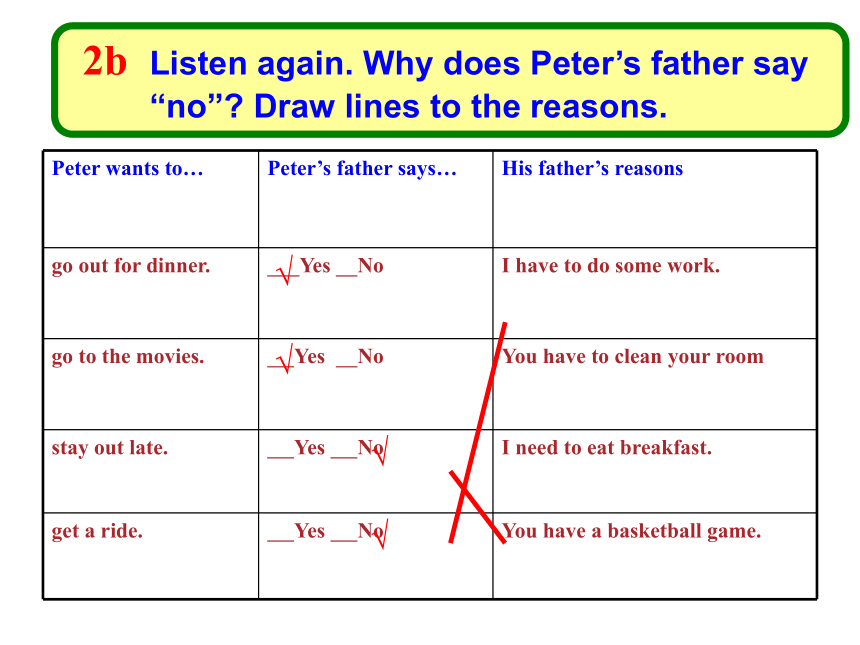
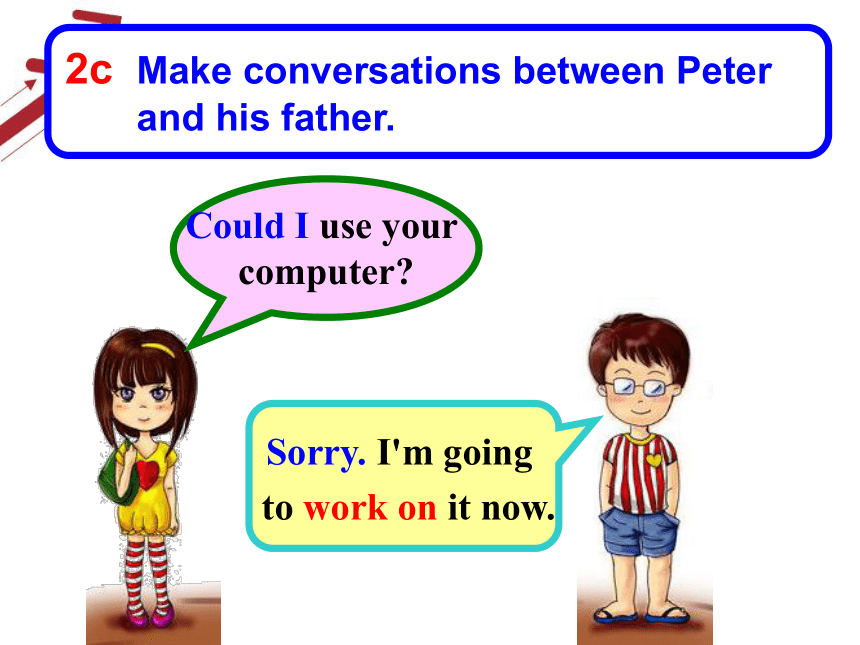
文档简介
课件109张PPT。Unit 3Could you please clean your room?SectionA 1a-2ddo the dishes
洗餐具take out the rubbish
扔垃圾A: What chores does he do every day?
B: He … every day. A: What chores does he do every day?
B: He … every day. fold the clothes
叠衣服water the plant
浇花A: What chores does he do every day?
B: He … every day. sweep the floor
扫地make the bed
整理床铺1a Do you do these chores at home?
Discuss them with your partner. 1a Do you do these chores at home?
Discuss them with your partner. 1. do the dishes
2. take out the rubbish
3. fold your clothes
4. sweep the floor
5. make your bed
6. clean the living room 1b Listen. Who will do these chores?
Check (√) Peter’s mother or Peter.√√√√√√1c Make conversations about the chores in 1a. Could you please
sweep the floor? Yes, sure. Can
you do the dishes?Well, could you please
do them. I’m going to
clean the living room. No problem.2a Listen. Peter asks his father if he
can do four things. What does his
father say? Check (√) “yes” or “no”. √√√√2b Listen again. Why does Peter’s father say
“no”? Draw lines to the reasons. √√√√ 2c Make conversations between Peter
and his father. 2c Make conversations between Peter
and his father. 2d Role-play the conversation. Sister: Tony, could you please help out with a few things?
Brother: Could I at least finish watching this show?
Sister: No. I think two hours of TV is enough for you!
Brother: Fine. What do you want me to do?Sister: Could you take out the rubbish, fold the clothes and do the dishes?
Brother: So much?
Sister: Yes, because Mom will be back from shopping any minute now. And she won’t be happy if she sees this mess.
Brother: But the house is already pretty clean and tidy!
Sister: Yes, well, it’s clean, but it’s not “mother clean”.Language points1. help out动词短语,表示在某人繁忙或
遇到困难时“给予帮助”。
help和out之间还可以加入具体的“人”。
如: He helped me out with my task. 他帮我完成了任务。
They helped (us) out with the clean-
up. 他们帮助我们做大扫除。Language points2. at least 至少
如:We should brush our teeth at least
twice a day. 我们每天应该至少刷两次牙。
3. be back 回来
如:I won’t be back till 11:00. 我11点以前回不来。 Language points4. any minute now 一种常见的口语表达法,相当于“随时;马上;在任何时刻”的意思,表示事情有可能在极短的时间内发生或眼下就要发生。
minute还可以用second, moment, time等词替换。
如:Don’t worry, he will come here any
minute now.
别担心, 他会马上来这儿。 Language pointsThe guests are arriving any time now but we’re still not ready.
客人即刻就到,但我们还没有准备好。
We’re expecting them any moment now.
我们期待他们随时到来。用下列词的适当形式填空。clean sweep take out make fold
living room work have do can1.______you please clean your room?
2.Jerry's mom _______the floor every Sunday.
3.There is a TV in the ___________.
4.Judy _______hard in a hospital. She is a nurse.Couldsweepsliving roomworks5.Sam's father is a policeman. He's busy.
So Sam ________ to do the chores.
6.Look!Dan is ____________ the trash.
7.Her mother works in a restaurant. She ______
the table after people have dinner.
8.Amy doesn't like _______the dishes.
9.Could you please _______ your bed?
10.Tracy can _______ her clothes.hastaking outcleansdoingmakefoldR 八年级下册Unit 3Could you please clean your room?SectionA 3a-3c
Grammar Focus-4c Reading3a Read the story and answer the questions. 1. Why was Nancy’s mom angry with her?
2. Did they solve the problem? How?Because she didn’t do any housework.
Yes, they did. They need to share the housework.3b Read the sentences below. Underline
the sentences from the reading that mean
the same thing. 1. Neither of us did any housework for a week.
2. My mom came over as soon as I sat down in front of the TV.
3. You’re tired, but I’m tired, too.3b Read the sentences below. Underline
the sentences from the reading that mean
the same thing. 1 For one week , she did not do any housework and neither did I .
The minute I sat down in front of the TV, my mom come over.
I ‘m just as tired as you are.3c Decide whether the underlined words
in the sentences are verbs or nouns.
Then write another sentence using the
underlined wordin the other form. Could you take the dog for a walk? (noun)
2. Could I watch one show first?I walked home from school. (verb)
Let’s show a picture to you. (verb)3c3. I can’t work all day.
4. You watch TV all the time.
5. “What happened?” she asked in surprise.It’s difficult to find work in this city. (noun)
How much is that watch? (noun)
It won’t surprise me if he loses the exam. (verb)Grammar Focus语法内容请见学案对应处4a Write R for requests and P for permissions.
Then match each one with the correct response. a. Yes, here you are.
b. Hmm. How much do you need?
c. Yes, sure. No problem. I finished reading it last night.
d. Yes, but don’t come back too late.
e. No, I can’t. I cut my finger and
I’m trying not to get it wet.4a1. ___ Could I hang out with my friends
after the movies? 出去玩
2. ___ Could you please pass me the salt?
3. ___ Could I borrow that book?
4. ___ Could you help me do the
dishes?
5. ___ Could you lend me some
money?PRPRRdacebA: I hate to ____ chores.
B: Well, I hate some chores too, but I like
other chores.
A: Really? Great! ______ I ask you to _____ me
with some chores then?
B: What do you need help with?
A: ______ you please _____ my clothes for me?
B: I don’t want to do that! It’s boring!doCould helpCould foldA: OK. Then ______ you ______ do the
dishes for me?
B: Sure, no problem. But _____ we go to
the movies after that?
A: Sure. I’ll finish my homework while you
help me with the dishes. Then we can go
to the movies. could pleasecould 4c Make a list of things your group needs to
do for a camping trip. Then discuss who
will do them and complete the chart. 4c Language points1. You watch TV all the time and ...
all the time(在该段时间内)一直;向来, 一向;时时刻刻
如: I do this all the time.
我一直是这么做的。
This happens all the time.
这种情况是时时发生的。Language points2. I’m just as tired as you are!
as ... as 意为 “和……一样” ,表示同级的比较。使用时要注意第一个as为副词,第二个as为连词。其基本结构为:as +?adj./?adv.?+ as。
This?film?is?as?interesting?as?that?one.
这部电影和那部电影一样有趣。
Your?pen?writes?as?smoothly?as?mine.
你的钢笔书写起来和我的一样流畅。Language points3. For one week, she did not do any housework and neither did I.
neither 用作副词,作“也不”解释,放在句首,表示前面否定的内容也适用于另一个人或物,句子须采用部分倒装。此时也可用nor替换 neither 使用。— I?don’t?like?this?dress.?
我不喜欢这件连衣裙。
— Neither?/?Nor?do?I.?我也不喜欢。
注意:neither 之后的主语要置于助动词或系动词之后。Language pointsneither 用作代词,表示“两者都不,双方均不”。例如:
He?answered?neither?of?the?letters.?
他两封信都没回。
— Which?one?would?you?like??
你喜欢哪一个?
— Neither.?
两个都不喜欢。?Language pointsborrow和lend
borrow和lend都有“借”的意思,但它们的含义和用法有所不同。
★ borrow表示“借入”,即把本来不属于自己的东西借来暂时使用,常与介词from连用。如:
You can borrow a book from the library.?
★ lend表示“借出”,即把属于自己的东西借给别人暂时使用,常与介词to连用,也可以跟双宾语。如:
He’s going to lend his bike to Tom.
You mustn’t lend others my pen.? 1. My twin brothers promised my parents to give up playing computer games, but ________ of them made it.
A. none B. neither C. either D. both
2.—Can I _______ your bike?
—With pleasure. But you mustn’t _______ it to
others.
A. lend; borrow B. borrow; lend
C. lend; lend D. borrow; borrow BB3.(2012·新疆阜康)—Why don’t you buy the bike, Mary?
— It’s too expensive. I can’t______ it.
A. sell B. lend C. keep D. afford
4. (2013·东莞)If Nancy ______ the exam, she will go to Australia for English study.
A. pass B. passed C. passes D. will pass
5. A: Could you please sweep the floor?
B: ____. I have to do my homework.
A. Yes, sure. B. Why not?
C. Sorry, you can‘t D. Sorry, I can‘t DCDR 八年级下册Unit 3Could you please clean your room?SectionB 1a- 1eWhat do your parents ask you to do?do choresstudy hardWhat do you ask your parents’ permission for?buy drinks and snacksWhat do you ask your parents’ permission for?invite friends
to a party1a What do teenagers ask their parents’
permission for? What do parents ask
their teenagers to do? Write parents
or teenagers next to each phrase. 1. buy some drinks and
snacks
2. borrow some money
3. clean your roomteenagersteenagersparents 4. invite my
friends to a party
5. go to the store
6. use your CD player
7. take out the rubbish
8. make your bed1ateenagersteenagersteenagersparentsparents 1b Use the phrases in 1a to make conversations. Parent: Could you please…?
Child: Yes, sure. / Sorry, I can’t.
I have to ... 1bChild: Could I …?
Parent: Yes, you can. / No, you can’t. You ... buy some drinks and snacks borrow some money invite my friends to a party go to the store1cListen to a conversation between Sandy and her mom. Check ( ) the things in 1a that you hear.1c 1. buy some drinks and snacks
2. borrow some money
3. clean your room
4. invite my friends to a party
5. go to the store
6. use your CD player
7. take out the rubbish
8. make your bed1dListen again. Fill in the chart.buy some drinks and snacksborrow some moneyclean her roomuse her mom’s CD playermove the big chairs to
the bedroom
clean the living room1eYou are having a party. Ask your partner for help with these things:go to the store buy drinks and snacks
do the dishes clean the living room
take out the rubbishPracticeA: Would you like to come to my birthday party?
B: Yes, I’d love to./Sorry, I can’t. I have to…
A: Could you please take out the rubbish?
B: Yes, sure./No, I can’t. I have to do…PracticeA: Could you please buy drinks and snacks?
B: Yes, sure./No, I can’t. I have to do…PracticeA: Could you please take out the rubbish?
B: Yes, sure./No, I can’t. I have to do…I. 根据句意及所给首字母提示,补全句
中所缺单词。
1. He was i_____ but nobody took him to the hospital.
2. If you don’t study hard, your grades will d______.
3. I like Old Henry because he often p_______ us with hot water.llrop rovides4. We can d______ on him for help.
5. Mother thinks playing computer games is a w______ of time.epend asteR 八年级下册Unit 3Could you please clean your room?SectionB 2a-2b2a Discuss the questions with
your partner. 1. What do you often do to help your parents at home?
2. Do you think kids should help out with chores at home?2bThe Sunday Mail magazine invited parents to write about whether they think young people should do chores at home. Skim the following letters. Which one agrees and which one disagrees?Answer the questions.1. What is Ms. Miller’s opinion?She thinks doing chores is parents’ job.2. What is Mr. Smith’s opinion?He thinks it’s important for children to do chores and help their parents with housework.Language points1. Kids these days already have enough stress from school.
(1)enough作形容词意思是“足够的,充分的”,在句中多作定语,一般修饰复数名词或不可数名词,可置于所修饰的名词之前,修饰形容词或副词时enough要置于其后。当主语是it或是特定数量时, enough也可用作表语,其后常接for引起的短语或动词不定式。
如:He has enough money to buy a car.
他有足够的钱买一辆汽车。Language points(2)stress意为“精神压力;心理负担”是不可数名词,表示具体的压力的事情时是可数名词。
如:He has enough stress from his work。
他再工作上压力很大。
Some students are completely struck down
by the stresses of examinations.
有些学生被考试的压力完全压垮了。 Language points2. Housework is a waste of their time. 做家务是浪费他们的时间。
waste意为“浪费;滥用”时是不可数名词,waste后常接of短语作其定语;其形容词是wasteful,意为“浪费的”。
如:It's only a waste of time to speak to her. The routine work is a waste of her talents.
做这样千篇一律的工作,是浪费了她的才能。和她说话纯粹是浪费时间。Language points☆waste还可以用作动词,意为“浪费;滥用;消耗 ”。
如:I don't like to waste your time.
我不愿浪费你的时间。
也可用作形容词,意为“荒芜的;无用的;浪费的”。
如:Waste water from factories should be treated before flowing into rivers.
工厂里的废水在流入河里之前应该经过处理。
Language points 3. They should spend their time on schoolwork in order to get good grades.
in order to意为“目的是,为了”, 用来引导目的状语,表目的。其后接动词原形, 不定式可以表示目的状语,直接用to do 表示;可以放在句首,也可位于句中,其否定式分别为:in order not to 。
如:In order to finish this task, we'll have to work day and night.
为了完成这个任务,我们必须日夜不停的工作。
We started early in order to arrive before dark.为了在天黑前到达,我们很早就动身了。Language points4. It is the parents’job to provide a clean and comfortable environment at home for their children.
provide用作及物动词时,意为“提供,供应”,后可接名词或代词作简单宾语.
如:The peasants provide us with grain and vegetables. 农民供给我们粮食和蔬菜。
Did your parents provide food and clothes for you in the university? 你父母供给你在大学的衣食了吗? Language pointsprovide还可接双宾语,常用介词for引出间接宾语,也可用介词with引出直接宾语,有时with可省略。即常用于短语provide sb. with sth. 与provide sth. for sb.意思相同,均为“为某人提供某物”,两者通常可相互转换。
如:Mr Smith provided food for us.
= Mr Smith provided us with food.
史密斯先生为我们提供食物。provide用作不及物动词时,意为“养;抚养”,常和介词for搭配使用。
eg:Must he provide for his family?
他必须抚养他的家人吗?
provide意为“准备”时,常和介词against / for搭配使用。
如:They provided against the attack.
他们做好准备以防受攻击。
Provide for your old age, please.
请为你将来年老而准备吧。Language pointsAC1.He doesn’t do his homework _________.So he always makes some mistakes.
A.careful enough B.enough careful
C.carefully enough D.enough carefully
2. I hope everyone can care about ______ the environment and stop ______ things.
A.protecting; wasting B.protecting; to waste
C.protect; wasting D.protect; to wasteC3.She got up early this morning _______ he could catch the first bus.
A. in order to B. in order that
C. all that D. whether
4. Textbooks for junior students ______ for free in most areas of China.
A. provide B. provided C. are providedBUnit 3Could you please clean your room?Section B (2c-3b)R 八年级下册Are you a polite student?How can we be polite?Don’t jump the queue.offer the seat to the old.Can you say anything else
about polite behavior? 2cAccording to Ms. Miller and Mr. Smith, what
are the pros and cons about kids doing chores?Doing chores helps children understand the idea of fairness.Parents should provide
a clean and comfortable
environment at home
for their children.I. 完成句子,每空词数不限。
1. Ms. Miller thinks children should spend their time on schoolwork in order to ________________________
____________________.
2. Mr. Smith thinks these days children depend on _______________________.Read the letters again and finish the following tasks. get good grades and get into a good universitytheir parents too muchII. 判断正(T)误(F)。
( )3. Ms. Miller thinks doing chores is not difficult.
( )4. Mr. Smith’s neighbors’ son
looked after himself well during
his first year in the college.
TF 2d Write one sentence with
each phrase from the letters.1. a waste of time
It’s a waste of time to water the garden when it is raining.
2. there is no need for… to
There is no need for you to go to the town. 2d3. do not mind
I do not mind sweeping the floor.
4. spend time on
I spent half of an hour on my homework.
5. in order to
He worked very hard in order to get the job. 2d6. it is not enough to
It is not enough to clean up the parks.
7. the earlier…the better
The earlier you give up smoking, the better it is for your health.2e Discuss the questions with a partner.1. Which letter do you agree with? Why?
2. What would you say to the person who wrote the letter you don’t agree
with?3a Do you think children should do some
chores at home? Why or why not? Discuss
this with a partner and take notes. 3b Write a letter to the Sunday Mail and
express your opinion. Dear Sir or Madam,
I think /believe that ________________.
I agree/disagree that ________________.
I think it is fair/unfair for children to
_______________________________.
I think children should/should not
_____________________________3bbecause __________________________.
For example, they should/
should not ________________________
because __________________________.
Yours truly,
__________写作指导1. 信头:发信人地址和日期。
有时可省去发信人地址,但一般要写日期。放在信纸的右上方。
2. 称呼:对收信人的尊称。
常用Dear,后用名字,而Mr,Mrs,Miss后不能单独用名字,而是姓或姓与名,如:John Smith的称呼,是Mr Smith,Mr John Smith或 Dear John。称呼后用逗号。
3. 正文。写作指导4. 结尾:发信人对收信人的谦称或敬语。放在信的右下方。要特别注意英语习惯,不可根据汉语意思写“此致敬礼”、“祝您健康”之类的中国式的结尾语。
写给同龄人或年长的朋友: Yours? sincerely,Yours等等。
写给亲朋好友: Love,Best wishes等等。
5. 签名:一般在结尾语的下面一行。 常见的私人信件的开头方式:
高兴:I was so glad/pleased/happy to receive your letter.
感谢:Thank you for your wonderful gift / your interesting letter.
关心与询问:How are you these days?/ How are you getting on these days?/ How are you getting on with your work/studies?
抱歉:I am sorry that I did not write to you sooner but I have been very busy these days. 一般在表示道歉没有及时给对方写信
时,还要简述原因或写上安慰的话。
遗憾:I was sorry to learn that you did not do well in the examination. / I was so upset to hear that you are ill these days. I do hope you are getting better.R 八年级下册Unit 3Could you please clean your room?Self Check 第6课时What chores do you do every day?clean the roomwater the plantsweep the floor1 Make a list of chores using these verbs.1.do ____________________________
2.clean __________________________
3.make__________________________1 Make a list of chores using these verbs.4.fold ___________________________
5.sweep _________________________
6.take out ________________________2 Are these polite requests or permissions? Write the numbers in the correct places in the chart. 1.Could you pleas do your homework?
2.Could I watch TV?
3.Could you take out the rubbish first?
4.Could I use your computer?
5.Could I leave now?
6.Could you come back before nine?123456Use the questions in activity 2 to write a conversation.
A:______________________
B:______________________
…?单项选择??
1.? —What?a?dirty?room! You?shouldn’t?throw?your?waste?things?everywhere.?????— Oh,?I?am?sorry,?I?am?going?to?_____and?put?them?
in?the?waste?box.????
?A.?fold?my?clothes?????B.?take?out?the?trash?????
C.?watch?TV
小结训练B2.?Don’t?_________?the?dog.?it’s?dangerous,?
it’ll?bite?you.?????
A.?play?with???B.?play???C.?play?for???
3.?—Jim,?come?out.?Let’s?go?to?play
?football.?????
—Sorry.?I’m?_______?a?maths problem.?????
A.?working?out???B.?working?on???C.?working?for?AA英汉互译
1.?play?with?___________????
2.?have?a?test?___________??
3.?do?chores?___________????
4.?take?out?___________???
5.?make?the?bed?__________???
6.?从……借___________????
7.?喂狗___________????????
8.?照顾___________??
9.?邀请某人到……__________??
10.?忙于/从事___________???
11.?洗餐具___________????
12.?做饭___________
只要愿意学习,就一定能够学会。
—— 列宁
洗餐具take out the rubbish
扔垃圾A: What chores does he do every day?
B: He … every day. A: What chores does he do every day?
B: He … every day. fold the clothes
叠衣服water the plant
浇花A: What chores does he do every day?
B: He … every day. sweep the floor
扫地make the bed
整理床铺1a Do you do these chores at home?
Discuss them with your partner. 1a Do you do these chores at home?
Discuss them with your partner. 1. do the dishes
2. take out the rubbish
3. fold your clothes
4. sweep the floor
5. make your bed
6. clean the living room 1b Listen. Who will do these chores?
Check (√) Peter’s mother or Peter.√√√√√√1c Make conversations about the chores in 1a. Could you please
sweep the floor? Yes, sure. Can
you do the dishes?Well, could you please
do them. I’m going to
clean the living room. No problem.2a Listen. Peter asks his father if he
can do four things. What does his
father say? Check (√) “yes” or “no”. √√√√2b Listen again. Why does Peter’s father say
“no”? Draw lines to the reasons. √√√√ 2c Make conversations between Peter
and his father. 2c Make conversations between Peter
and his father. 2d Role-play the conversation. Sister: Tony, could you please help out with a few things?
Brother: Could I at least finish watching this show?
Sister: No. I think two hours of TV is enough for you!
Brother: Fine. What do you want me to do?Sister: Could you take out the rubbish, fold the clothes and do the dishes?
Brother: So much?
Sister: Yes, because Mom will be back from shopping any minute now. And she won’t be happy if she sees this mess.
Brother: But the house is already pretty clean and tidy!
Sister: Yes, well, it’s clean, but it’s not “mother clean”.Language points1. help out动词短语,表示在某人繁忙或
遇到困难时“给予帮助”。
help和out之间还可以加入具体的“人”。
如: He helped me out with my task. 他帮我完成了任务。
They helped (us) out with the clean-
up. 他们帮助我们做大扫除。Language points2. at least 至少
如:We should brush our teeth at least
twice a day. 我们每天应该至少刷两次牙。
3. be back 回来
如:I won’t be back till 11:00. 我11点以前回不来。 Language points4. any minute now 一种常见的口语表达法,相当于“随时;马上;在任何时刻”的意思,表示事情有可能在极短的时间内发生或眼下就要发生。
minute还可以用second, moment, time等词替换。
如:Don’t worry, he will come here any
minute now.
别担心, 他会马上来这儿。 Language pointsThe guests are arriving any time now but we’re still not ready.
客人即刻就到,但我们还没有准备好。
We’re expecting them any moment now.
我们期待他们随时到来。用下列词的适当形式填空。clean sweep take out make fold
living room work have do can1.______you please clean your room?
2.Jerry's mom _______the floor every Sunday.
3.There is a TV in the ___________.
4.Judy _______hard in a hospital. She is a nurse.Couldsweepsliving roomworks5.Sam's father is a policeman. He's busy.
So Sam ________ to do the chores.
6.Look!Dan is ____________ the trash.
7.Her mother works in a restaurant. She ______
the table after people have dinner.
8.Amy doesn't like _______the dishes.
9.Could you please _______ your bed?
10.Tracy can _______ her clothes.hastaking outcleansdoingmakefoldR 八年级下册Unit 3Could you please clean your room?SectionA 3a-3c
Grammar Focus-4c Reading3a Read the story and answer the questions. 1. Why was Nancy’s mom angry with her?
2. Did they solve the problem? How?Because she didn’t do any housework.
Yes, they did. They need to share the housework.3b Read the sentences below. Underline
the sentences from the reading that mean
the same thing. 1. Neither of us did any housework for a week.
2. My mom came over as soon as I sat down in front of the TV.
3. You’re tired, but I’m tired, too.3b Read the sentences below. Underline
the sentences from the reading that mean
the same thing. 1 For one week , she did not do any housework and neither did I .
The minute I sat down in front of the TV, my mom come over.
I ‘m just as tired as you are.3c Decide whether the underlined words
in the sentences are verbs or nouns.
Then write another sentence using the
underlined wordin the other form. Could you take the dog for a walk? (noun)
2. Could I watch one show first?I walked home from school. (verb)
Let’s show a picture to you. (verb)3c3. I can’t work all day.
4. You watch TV all the time.
5. “What happened?” she asked in surprise.It’s difficult to find work in this city. (noun)
How much is that watch? (noun)
It won’t surprise me if he loses the exam. (verb)Grammar Focus语法内容请见学案对应处4a Write R for requests and P for permissions.
Then match each one with the correct response. a. Yes, here you are.
b. Hmm. How much do you need?
c. Yes, sure. No problem. I finished reading it last night.
d. Yes, but don’t come back too late.
e. No, I can’t. I cut my finger and
I’m trying not to get it wet.4a1. ___ Could I hang out with my friends
after the movies? 出去玩
2. ___ Could you please pass me the salt?
3. ___ Could I borrow that book?
4. ___ Could you help me do the
dishes?
5. ___ Could you lend me some
money?PRPRRdacebA: I hate to ____ chores.
B: Well, I hate some chores too, but I like
other chores.
A: Really? Great! ______ I ask you to _____ me
with some chores then?
B: What do you need help with?
A: ______ you please _____ my clothes for me?
B: I don’t want to do that! It’s boring!doCould helpCould foldA: OK. Then ______ you ______ do the
dishes for me?
B: Sure, no problem. But _____ we go to
the movies after that?
A: Sure. I’ll finish my homework while you
help me with the dishes. Then we can go
to the movies. could pleasecould 4c Make a list of things your group needs to
do for a camping trip. Then discuss who
will do them and complete the chart. 4c Language points1. You watch TV all the time and ...
all the time(在该段时间内)一直;向来, 一向;时时刻刻
如: I do this all the time.
我一直是这么做的。
This happens all the time.
这种情况是时时发生的。Language points2. I’m just as tired as you are!
as ... as 意为 “和……一样” ,表示同级的比较。使用时要注意第一个as为副词,第二个as为连词。其基本结构为:as +?adj./?adv.?+ as。
This?film?is?as?interesting?as?that?one.
这部电影和那部电影一样有趣。
Your?pen?writes?as?smoothly?as?mine.
你的钢笔书写起来和我的一样流畅。Language points3. For one week, she did not do any housework and neither did I.
neither 用作副词,作“也不”解释,放在句首,表示前面否定的内容也适用于另一个人或物,句子须采用部分倒装。此时也可用nor替换 neither 使用。— I?don’t?like?this?dress.?
我不喜欢这件连衣裙。
— Neither?/?Nor?do?I.?我也不喜欢。
注意:neither 之后的主语要置于助动词或系动词之后。Language pointsneither 用作代词,表示“两者都不,双方均不”。例如:
He?answered?neither?of?the?letters.?
他两封信都没回。
— Which?one?would?you?like??
你喜欢哪一个?
— Neither.?
两个都不喜欢。?Language pointsborrow和lend
borrow和lend都有“借”的意思,但它们的含义和用法有所不同。
★ borrow表示“借入”,即把本来不属于自己的东西借来暂时使用,常与介词from连用。如:
You can borrow a book from the library.?
★ lend表示“借出”,即把属于自己的东西借给别人暂时使用,常与介词to连用,也可以跟双宾语。如:
He’s going to lend his bike to Tom.
You mustn’t lend others my pen.? 1. My twin brothers promised my parents to give up playing computer games, but ________ of them made it.
A. none B. neither C. either D. both
2.—Can I _______ your bike?
—With pleasure. But you mustn’t _______ it to
others.
A. lend; borrow B. borrow; lend
C. lend; lend D. borrow; borrow BB3.(2012·新疆阜康)—Why don’t you buy the bike, Mary?
— It’s too expensive. I can’t______ it.
A. sell B. lend C. keep D. afford
4. (2013·东莞)If Nancy ______ the exam, she will go to Australia for English study.
A. pass B. passed C. passes D. will pass
5. A: Could you please sweep the floor?
B: ____. I have to do my homework.
A. Yes, sure. B. Why not?
C. Sorry, you can‘t D. Sorry, I can‘t DCDR 八年级下册Unit 3Could you please clean your room?SectionB 1a- 1eWhat do your parents ask you to do?do choresstudy hardWhat do you ask your parents’ permission for?buy drinks and snacksWhat do you ask your parents’ permission for?invite friends
to a party1a What do teenagers ask their parents’
permission for? What do parents ask
their teenagers to do? Write parents
or teenagers next to each phrase. 1. buy some drinks and
snacks
2. borrow some money
3. clean your roomteenagersteenagersparents 4. invite my
friends to a party
5. go to the store
6. use your CD player
7. take out the rubbish
8. make your bed1ateenagersteenagersteenagersparentsparents 1b Use the phrases in 1a to make conversations. Parent: Could you please…?
Child: Yes, sure. / Sorry, I can’t.
I have to ... 1bChild: Could I …?
Parent: Yes, you can. / No, you can’t. You ... buy some drinks and snacks borrow some money invite my friends to a party go to the store1cListen to a conversation between Sandy and her mom. Check ( ) the things in 1a that you hear.1c 1. buy some drinks and snacks
2. borrow some money
3. clean your room
4. invite my friends to a party
5. go to the store
6. use your CD player
7. take out the rubbish
8. make your bed1dListen again. Fill in the chart.buy some drinks and snacksborrow some moneyclean her roomuse her mom’s CD playermove the big chairs to
the bedroom
clean the living room1eYou are having a party. Ask your partner for help with these things:go to the store buy drinks and snacks
do the dishes clean the living room
take out the rubbishPracticeA: Would you like to come to my birthday party?
B: Yes, I’d love to./Sorry, I can’t. I have to…
A: Could you please take out the rubbish?
B: Yes, sure./No, I can’t. I have to do…PracticeA: Could you please buy drinks and snacks?
B: Yes, sure./No, I can’t. I have to do…PracticeA: Could you please take out the rubbish?
B: Yes, sure./No, I can’t. I have to do…I. 根据句意及所给首字母提示,补全句
中所缺单词。
1. He was i_____ but nobody took him to the hospital.
2. If you don’t study hard, your grades will d______.
3. I like Old Henry because he often p_______ us with hot water.llrop rovides4. We can d______ on him for help.
5. Mother thinks playing computer games is a w______ of time.epend asteR 八年级下册Unit 3Could you please clean your room?SectionB 2a-2b2a Discuss the questions with
your partner. 1. What do you often do to help your parents at home?
2. Do you think kids should help out with chores at home?2bThe Sunday Mail magazine invited parents to write about whether they think young people should do chores at home. Skim the following letters. Which one agrees and which one disagrees?Answer the questions.1. What is Ms. Miller’s opinion?She thinks doing chores is parents’ job.2. What is Mr. Smith’s opinion?He thinks it’s important for children to do chores and help their parents with housework.Language points1. Kids these days already have enough stress from school.
(1)enough作形容词意思是“足够的,充分的”,在句中多作定语,一般修饰复数名词或不可数名词,可置于所修饰的名词之前,修饰形容词或副词时enough要置于其后。当主语是it或是特定数量时, enough也可用作表语,其后常接for引起的短语或动词不定式。
如:He has enough money to buy a car.
他有足够的钱买一辆汽车。Language points(2)stress意为“精神压力;心理负担”是不可数名词,表示具体的压力的事情时是可数名词。
如:He has enough stress from his work。
他再工作上压力很大。
Some students are completely struck down
by the stresses of examinations.
有些学生被考试的压力完全压垮了。 Language points2. Housework is a waste of their time. 做家务是浪费他们的时间。
waste意为“浪费;滥用”时是不可数名词,waste后常接of短语作其定语;其形容词是wasteful,意为“浪费的”。
如:It's only a waste of time to speak to her. The routine work is a waste of her talents.
做这样千篇一律的工作,是浪费了她的才能。和她说话纯粹是浪费时间。Language points☆waste还可以用作动词,意为“浪费;滥用;消耗 ”。
如:I don't like to waste your time.
我不愿浪费你的时间。
也可用作形容词,意为“荒芜的;无用的;浪费的”。
如:Waste water from factories should be treated before flowing into rivers.
工厂里的废水在流入河里之前应该经过处理。
Language points 3. They should spend their time on schoolwork in order to get good grades.
in order to意为“目的是,为了”, 用来引导目的状语,表目的。其后接动词原形, 不定式可以表示目的状语,直接用to do 表示;可以放在句首,也可位于句中,其否定式分别为:in order not to 。
如:In order to finish this task, we'll have to work day and night.
为了完成这个任务,我们必须日夜不停的工作。
We started early in order to arrive before dark.为了在天黑前到达,我们很早就动身了。Language points4. It is the parents’job to provide a clean and comfortable environment at home for their children.
provide用作及物动词时,意为“提供,供应”,后可接名词或代词作简单宾语.
如:The peasants provide us with grain and vegetables. 农民供给我们粮食和蔬菜。
Did your parents provide food and clothes for you in the university? 你父母供给你在大学的衣食了吗? Language pointsprovide还可接双宾语,常用介词for引出间接宾语,也可用介词with引出直接宾语,有时with可省略。即常用于短语provide sb. with sth. 与provide sth. for sb.意思相同,均为“为某人提供某物”,两者通常可相互转换。
如:Mr Smith provided food for us.
= Mr Smith provided us with food.
史密斯先生为我们提供食物。provide用作不及物动词时,意为“养;抚养”,常和介词for搭配使用。
eg:Must he provide for his family?
他必须抚养他的家人吗?
provide意为“准备”时,常和介词against / for搭配使用。
如:They provided against the attack.
他们做好准备以防受攻击。
Provide for your old age, please.
请为你将来年老而准备吧。Language pointsAC1.He doesn’t do his homework _________.So he always makes some mistakes.
A.careful enough B.enough careful
C.carefully enough D.enough carefully
2. I hope everyone can care about ______ the environment and stop ______ things.
A.protecting; wasting B.protecting; to waste
C.protect; wasting D.protect; to wasteC3.She got up early this morning _______ he could catch the first bus.
A. in order to B. in order that
C. all that D. whether
4. Textbooks for junior students ______ for free in most areas of China.
A. provide B. provided C. are providedBUnit 3Could you please clean your room?Section B (2c-3b)R 八年级下册Are you a polite student?How can we be polite?Don’t jump the queue.offer the seat to the old.Can you say anything else
about polite behavior? 2cAccording to Ms. Miller and Mr. Smith, what
are the pros and cons about kids doing chores?Doing chores helps children understand the idea of fairness.Parents should provide
a clean and comfortable
environment at home
for their children.I. 完成句子,每空词数不限。
1. Ms. Miller thinks children should spend their time on schoolwork in order to ________________________
____________________.
2. Mr. Smith thinks these days children depend on _______________________.Read the letters again and finish the following tasks. get good grades and get into a good universitytheir parents too muchII. 判断正(T)误(F)。
( )3. Ms. Miller thinks doing chores is not difficult.
( )4. Mr. Smith’s neighbors’ son
looked after himself well during
his first year in the college.
TF 2d Write one sentence with
each phrase from the letters.1. a waste of time
It’s a waste of time to water the garden when it is raining.
2. there is no need for… to
There is no need for you to go to the town. 2d3. do not mind
I do not mind sweeping the floor.
4. spend time on
I spent half of an hour on my homework.
5. in order to
He worked very hard in order to get the job. 2d6. it is not enough to
It is not enough to clean up the parks.
7. the earlier…the better
The earlier you give up smoking, the better it is for your health.2e Discuss the questions with a partner.1. Which letter do you agree with? Why?
2. What would you say to the person who wrote the letter you don’t agree
with?3a Do you think children should do some
chores at home? Why or why not? Discuss
this with a partner and take notes. 3b Write a letter to the Sunday Mail and
express your opinion. Dear Sir or Madam,
I think /believe that ________________.
I agree/disagree that ________________.
I think it is fair/unfair for children to
_______________________________.
I think children should/should not
_____________________________3bbecause __________________________.
For example, they should/
should not ________________________
because __________________________.
Yours truly,
__________写作指导1. 信头:发信人地址和日期。
有时可省去发信人地址,但一般要写日期。放在信纸的右上方。
2. 称呼:对收信人的尊称。
常用Dear,后用名字,而Mr,Mrs,Miss后不能单独用名字,而是姓或姓与名,如:John Smith的称呼,是Mr Smith,Mr John Smith或 Dear John。称呼后用逗号。
3. 正文。写作指导4. 结尾:发信人对收信人的谦称或敬语。放在信的右下方。要特别注意英语习惯,不可根据汉语意思写“此致敬礼”、“祝您健康”之类的中国式的结尾语。
写给同龄人或年长的朋友: Yours? sincerely,Yours等等。
写给亲朋好友: Love,Best wishes等等。
5. 签名:一般在结尾语的下面一行。 常见的私人信件的开头方式:
高兴:I was so glad/pleased/happy to receive your letter.
感谢:Thank you for your wonderful gift / your interesting letter.
关心与询问:How are you these days?/ How are you getting on these days?/ How are you getting on with your work/studies?
抱歉:I am sorry that I did not write to you sooner but I have been very busy these days. 一般在表示道歉没有及时给对方写信
时,还要简述原因或写上安慰的话。
遗憾:I was sorry to learn that you did not do well in the examination. / I was so upset to hear that you are ill these days. I do hope you are getting better.R 八年级下册Unit 3Could you please clean your room?Self Check 第6课时What chores do you do every day?clean the roomwater the plantsweep the floor1 Make a list of chores using these verbs.1.do ____________________________
2.clean __________________________
3.make__________________________1 Make a list of chores using these verbs.4.fold ___________________________
5.sweep _________________________
6.take out ________________________2 Are these polite requests or permissions? Write the numbers in the correct places in the chart. 1.Could you pleas do your homework?
2.Could I watch TV?
3.Could you take out the rubbish first?
4.Could I use your computer?
5.Could I leave now?
6.Could you come back before nine?123456Use the questions in activity 2 to write a conversation.
A:______________________
B:______________________
…?单项选择??
1.? —What?a?dirty?room! You?shouldn’t?throw?your?waste?things?everywhere.?????— Oh,?I?am?sorry,?I?am?going?to?_____and?put?them?
in?the?waste?box.????
?A.?fold?my?clothes?????B.?take?out?the?trash?????
C.?watch?TV
小结训练B2.?Don’t?_________?the?dog.?it’s?dangerous,?
it’ll?bite?you.?????
A.?play?with???B.?play???C.?play?for???
3.?—Jim,?come?out.?Let’s?go?to?play
?football.?????
—Sorry.?I’m?_______?a?maths problem.?????
A.?working?out???B.?working?on???C.?working?for?AA英汉互译
1.?play?with?___________????
2.?have?a?test?___________??
3.?do?chores?___________????
4.?take?out?___________???
5.?make?the?bed?__________???
6.?从……借___________????
7.?喂狗___________????????
8.?照顾___________??
9.?邀请某人到……__________??
10.?忙于/从事___________???
11.?洗餐具___________????
12.?做饭___________
只要愿意学习,就一定能够学会。
—— 列宁
同课章节目录
- Unit 1 What's the matter?
- Section A
- Section B
- Unit 2 I'll help to clean up the city parks.
- Section A
- Section B
- Unit 3 Could you please clean your room?
- Section A
- Section B
- Unit 4 Why don't you talk to your parents?
- Section A
- Section B
- Unit 5 What were you doing when the rainstorm came
- Section A
- Section B
- Review of Units 1-5
- Unit 6 An old man tried to move the mountains.
- Section A
- Section B
- Unit 7 What's the highest mountain in the world?
- Section A
- Section B
- Unit 8 Have you read Treasure Island yet?
- Section A
- Section B
- Unit 9 Have you ever been to a museum?
- Section A
- Section B
- Unit 10 I've had this bike for three years.
- Section A
- Section B
